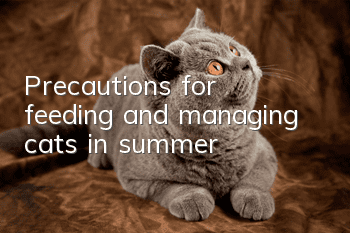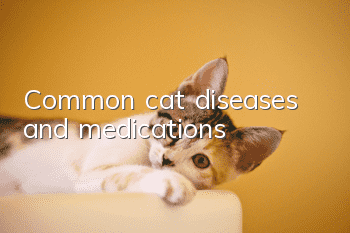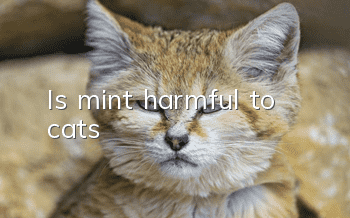Precautions for feeding and managing cats in summer

The hot summer is here again, which is not a good season for cats. In summer, we need to prevent cats from heatstroke due to excessive hair, and we are also worried about cats catching colds due to improper use of air conditioners. In summer, it rains and the south is mostly humid, so cats are prone to it. Infected skin diseases, so there are many aspects that need to be paid attention to when raising cats in summer.
1. Be cautious when blowing air conditioners
In fact, the probability of heat stroke in cats is quite small, but air conditioning disease requires attention. Cats are different from dogs. They rarely go outside to play, and few people go to walk them. When it is hot in summer, cats usually find a shady place to stay by themselves, so they generally do not suffer from heatstroke. Of course, there are exceptions. For example, leaving a cat alone in the car, even for just a few minutes, can lead to accidents. When going out with your cat, avoid leaving it in an open place without shade, and try to create a shady environment for it. Air-conditioning disease is a "seasonal disease" that both owners and cats need to pay special attention to. If you let a cat stay in an air-conditioned room for an hour or two and then suddenly take it out, it will be more likely to catch a cold or heat stroke when it is cold and hot. The best way is not to adjust the air conditioner temperature too low, which is more beneficial to both humans and cats. In addition, before leaving the air-conditioned room, you can raise the room temperature a little first, so that there is a gradual adjustment process, and it will not cause a cold due to physical difficulty in adapting. In particular, avoid suddenly leaving the cold air-conditioned room and returning to the air-conditioned room again. Therefore, it is best not to let cats develop the habit of blowing the air conditioner. If it is not too hot, just blow the fan. When a cat catches a cold, there will usually be an obvious increase in body temperature or a runny nose. If your cat shows these symptoms, you should take it to the pet hospital in time.
2. Don’t imitate dog shaving
Some owners like to shave their cats in order to give their cats a cool summer. It is recommended not to do this rashly. In fact, cats are very resistant to shaving their hair. If you do it forcefully, the owner will be scratched at least, and the cat will suffer from depression at worst. Like many animals, cats actually shed their fur on their own to combat the hot summer, so owners don’t have to worry too much about their fur being too thick, which will affect the body’s heat dissipation. Forcibly shaving will bring bad consequences, because most cats are greedy for beauty. Shaving affects appearance. It can make them "depressed" for a long time. but. When shedding hair. It is also important to try to satisfy the cat’s greed for beauty. For example, when a cat sheds its fur, it is inevitable that some fluff will stick to its skin. The resulting hairballs can be very uncomfortable and unsightly for your cat. At this time, it is recommended that the owner buy a comb specially designed for combing the pet's hair. Smooth it out. At the same time, it can also play a role in heat dissipation.
3. High temperature can easily breed parasites
The temperature is high in summer. In addition to avoiding the heat, parasites should not be underestimated. hot weatherWhen the cat is young, it is easy for cats to breed various germs, and there are more lice and fleas. They may also be infected with some parasites from elsewhere. Once the germs or bugs lurk, it will be more difficult. Although most cats love to be clean and will clean their fur by themselves, this does not guarantee that they are immune to bacteria or fleas. The hotter the weather, the more owners should pay attention to the cleanliness of their cats, and try not to let them play in dirty places or come into contact with other pets that are infected with parasites. It is recommended that cats wear anti-lice collars to reduce the chance of being infected with fleas or other parasites. If these parasites have been found on your cat, you can flush it with chemicals. There are now anti-parasite potions on the market. Pet owners can buy them to clean their cats. However, when using them, you must pay attention to the dosage instructions in the instructions, and be careful not to let your cat lick it off.
4. Eat fresh and adequate amounts of water
In the hot summer, cats’ appetite will decrease, so you can provide them with some plain food and add some whole grains and vegetables. If the cat doesn’t like the bland taste, don’t force it to change, as it will affect their growth. Once a cat's taste is formed, if the cat's food is suddenly changed, it usually takes time to adapt, and it may become resistant to meals because it doesn't like the new food, which is not worth the gain. Therefore, owners who plan to give their cats a lighter taste must understand their pet’s temper. In fact, there is no big problem in eating the same cat food. The recipe can be changed or not, but you must prepare enough water. In summer, cats’ bodies need a lot of water, so owners must prepare enough drinking water for them, otherwise it may easily lead to heatstroke.
5. Things to note
Cat’s food and water should be changed frequently. Similarly, cats’ drinking water is easy to deteriorate in summer, so it must be changed frequently. In addition to preventing the drinking water from becoming stale, it can also prevent the breeding of mosquitoes. Mosquitoes are not only harmful to humans, but also to animals! In addition, in summer, The amount of water a cat drinks will increase a lot, so remember to add water to the cat's water bowl frequently. If possible, it is best to equip the cat with an automatic water dispenser.
Cat's whole body is covered with fur. Except for a small number of sweat glands distributed on the toes, the rest of the body surface lacks sweat glands, so its ability to regulate heat is poor. In summer, the temperature is high and the humidity is high. Cats' body heat is not easy to dissipate, and they are prone to heatstroke, especially long-haired cats. Therefore, summer heatstroke is another big threat to cats. For this reason, providing cats with a dry, cool, ventilated living environment without direct sunlight is also an important aspect of daily management of cats. If a cat suddenly becomes ill in the hot summer and has a significantly elevated body temperature, difficulty breathing, a fast and weak pulse, and an unsteady gait, it should be considered whether it is heat stroke. At this time, the cat must be quickly moved to a ventilated and shady place, and the cat's body must be wiped with cold water. Ice cubes or ice packs must be placed on the cat's head. Cold water enema can also be used to help cool down the cat.
In summer, many owners will prepare for their cats to escape the heat. When cats are alone at home, they are afraid of heatstroke and turn on the air conditioner and fan for a day. Little do they know that this is very dangerous. Cats are very curious animals, and it is possible that fans and air conditioners will change. Prey for cats, so be careful.
- Is it feline plague if a cat only drinks water but doesn’t eat?
- Are most white cats with blue eyes deaf?
- What should I do if my cat doesn’t sleep in the nest?
- Cat suddenly vomits undigested cat food
- How long does a 3-month-old kitten sleep a day?
- Can cats eat walnuts?
- Why does a cat meow at night instead of meowing during the day?
- What cats are suitable for cage keeping?
- Is it illegal to keep leopard cats? Do you know the living habits of wild leopard cats?
- What causes cats to urinate randomly?



